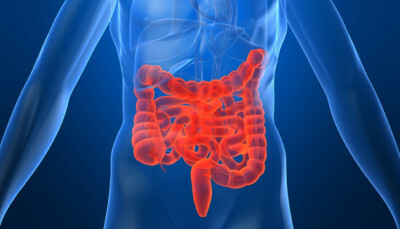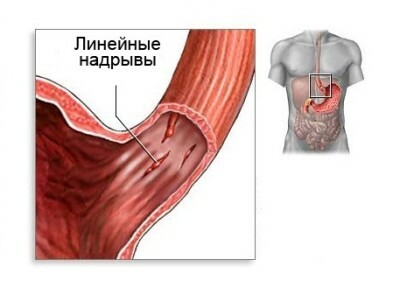1 What is gastric bleeding?
What is commonly called "gastric bleeding" in everyday life, experts call "gastrointestinal bleeding," or HCFC.This is a more general term, which implies bleeding in the entire digestive tract. Such bleeding is the most common cause of hospitalization of patients in surgical hospitals. Internal bleeding can cause more than a hundred diseases, although more than 70% are caused by patients suffering from ulcers.

Recommended to read
- General symptoms of digestive problems
- Symptoms and treatment of duodenal ulcer
- Urine in diastase: what is this analysis?
- Effective remedy for gastritis and stomach ulcer
Depending on a large number of factors, gastrointestinal bleeding can be divided into groups.
First, the bleeding happens:
- Acute, which happened unexpectedly and without warning, and chronic, often occurring imperceptibly.
- Explicit, with symptoms that are difficult to miss, and hidden, with which one can live for years and not to guess about its existence.
- Single and repeating, usually in the presence of a chronic stomach disease.
Secondly, in terms of severity, these groups are formed:
- Light bleeding.
- Hemorrhage of moderate severity.
- Heavy.
Thirdly, bleeding can happen in different areas of the gastrointestinal tract. It can be a bleeding:
- of the top departments - esophageal, gastric, duodenal;
- of the lower parts - enteral, colonic, rectal.
The exact place of bleeding is determined through the study of symptoms, as well as through laboratory tests and examinations. Usually it is necessary to understand what causes bleeding in the stomach, since without eliminating the root cause, treatment of the disease is very difficult.
2 Symptoms of pathology
The first harbingers of a serious problem can be things that are trite and unobvious. As long as the gastrointestinal bleeding is not strong, there can not be blood as such - too little to be detected by a human eye, at any rate. A person at this stage first of all suffers from such symptoms as blood loss, weakness, lethargy, reduced efficiency. Severe hemorrhage is accompanied by dizziness, pallor, cold sweat and frequent palpitation, a decrease in pressure. Unfortunately, very few people correlate this kind of symptoms with gastric bleeding, as in principle with some other complexities in the body. Lack of labor, work stress or seasonal malaise considers the patient a temporary phenomenon, each time again delaying a visit to a specialist.
-
 IMPORTANT TO KNOW! Gastritis? Ulcer? To have a stomach ulcer not turned into cancer, drink a glass. ..Read the article & gt; & gt;
IMPORTANT TO KNOW! Gastritis? Ulcer? To have a stomach ulcer not turned into cancer, drink a glass. ..Read the article & gt; & gt;
Much more difficult to miss symptoms such as vomiting with blood and blood in the stool.
Depending on the severity and location of the lesion, the blood may look different. The usual unchanged blood is easy to learn, but the blood that is recycled is capable of confusing many. When vomiting, such blood will resemble coffee grounds in color and consistency - this becomes after contact with gastric juice. The altered blood in the stool becomes dark in color, and the stools in consistence will be tarry, black in color. It can be liquid - it is also called melena. Blood can be mixed with the feces evenly, and can be located in it as separate clots. Sometimes the blood in the stool is small and determined only by special laboratory tests.

In some cases, it may be observed simply bleeding from the anus, not related to the act of defecation, caused by physical exertion or even completely for no reason. Bleeding can be of different severity, from subtle swabs on underwear and toilet paper to a trickle of blood comparable to similar discharges during menstruation. This symptom causes not so much panic as bloody vomiting, but this does not mean that you need to hesitate to contact a doctor.
-
 Gastroenterologist IMPORTANT: "I beg you, if you began to worry about abdominal pain, heartburn, nausea, do not in any way do gases. .."Read more & gt; & gt;
Gastroenterologist IMPORTANT: "I beg you, if you began to worry about abdominal pain, heartburn, nausea, do not in any way do gases. .."Read more & gt; & gt;
Since internal bleeding can be caused by a large number of underlying causes, it will in any case be accompanied by a set of individual symptoms specific to each individual disease. Usually, although not always, the number of symptoms will include stomach pain, stool problems and an acute reaction to certain types of food.
The volume of blood loss in gastrointestinal bleeding can reach 3-4 liters, and this already creates a risk for survival.
3 The root causes of
The leader among the causes of bleeding in the gastrointestinal tract are all kinds of ulcers. A special crookedness is the so-called stress ulcer. As its name implies, it causes chronic stress in the life of the patient, and its symptoms may be mild, but the bleeding caused by it is quite serious and can kill the patient if help is not provided in time.
TIP FROM THE MAIN GASTROENTEROLOGIST
Korotov SV: "I can recommend only one remedy for the rapid treatment of Ulcer and Gastritis, which is now recommended by the Ministry of Health. .." Read the reviews & gt; & gt;
Non-ulcer bleeding of the stomach may also occur - when the mucous membrane is damaged in a person who is not a peptic ulcer. The causes may be:
- gastric mucosal defects;
- ulcers resulting from injuries, such as burns;
- ulcers caused by taking medication;
- mucosal ruptures with frequent profuse vomiting;
- inflammatory bowel disease;
- hemorrhoids and anal fissures;
- tumors of the gastrointestinal tract.

A less obvious reason for the occurrence of bleeding in the gastrointestinal tract may be covered in blood vessels. Bleeding is possible due to sclerosis of the walls of stomach vessels, aneurysms, varicose veins in portal hypertension and, finally, due to connective tissue diseases such as rheumatism and systemic lupus erythematosus.
If everything is in order with the blood vessels, the problem can be found in the blood itself: for example, when a person suffers from thrombocytopenia or hemophilia, leukemia, K. avitaminosis. But not only blood diseases can lead to bleeding. They are capable to appear and at intestinal infections. Dysentery, salmonellosis - all these awkward unpleasant diseases are heard by ear, but not everyone knows about the terrible symptoms behind these words.
Finally, the most seemingly obvious cause of bleeding in the gastrointestinal tract is mechanical damage. A punch in the stomach that caused ruptures, or a swallowed sharp object that scratched the delicate walls of the stomach - these kinds of things are capable of leaving not only unpleasant memories, but also bleeding in the stomach.
4 When it is necessary to contact a specialist
What can cause gastrointestinal hemorrhage that was triggered, left untreated, on which they gave up, in the hope that "it somehow will resolve itself"?Alas, the answer can unpleasantly surprise. At the very least, the patient can wait for hemorrhagic shock caused by great blood loss, and anemia. If the situation worsens, the time of kidney failure, and then of multi-organ failure - that there is a final stage of acute diseases, which can be prevented or at least delayed by timely treatment, will come. About what awaits a person who has suffered "harmless" bleeding, which was caused, for example, by cancerous tumors, it is not worth writing. Well, the most disappointing statistics tells us that in 29% of cases, patients "face" a fatal outcome, if they delay with a visit to the doctor.
But even if the patient is lucky and his gastrointestinal hemorrhage is minimal and is caused not by something fatal, but by the simplest hemorrhoids, this kind of problems affect the quality of life. Often this is enough to make it unbearable. So is it worth it to suffer once again, if you can contact a specialist?

The doctor will not do anything supernatural if you turn to him, catching the first signs of gastric bleeding. First of all, the doctor will look for his reasons: after collecting an anamnesis of the patient, he will conduct a clinical examination, including a rectal examination( and this is not so terrible as it seems to an unprepared person).Clear and usual blood and feces can be prescribed. Occasionally, endoscopy, radiography, and magnetic resonance imaging are required. To engage in the diagnosis and treatment can be a number of doctors, from the therapist to the gastroenterologist and proctologist.
It is difficult to predict what treatment will be prescribed, because much depends on the underlying causes of gastrointestinal bleeding. Among the possible ways to solve the problem are options such as moxibustion or clamping of bleeding stomach vessels in order to mechanically stop the blood loss. To facilitate the patient's condition, cold compresses can be applied to the stomach. It is also possible to rinse the stomach with ice water to narrow the blood vessels and thereby reduce blood loss. In any case, the patient will be shown bed rest, rest, diet and replenishment of lost blood. Depending on the severity of the disease is prescribed as a drug treatment, and conduct therapy by transfusion. It may be useful to inject drugs and medications that help restore blood levels and replenish iron stores.
In difficult cases or in very acute forms, or if medication is not helpful, surgical intervention may be required.
5 Rules for maintaining gastric health
Because of the extensive causes of gastrointestinal bleeding, it is difficult to talk about specific prevention. It's important to keep track of your condition, listen to the body, do not ignore the changes in your health status towards its deterioration, especially if you are already suffering from some diseases that can cause gastrointestinal bleeding.
If the patient has an ulcer - you must follow a diet and take antiulcer drugs. The same applies to any other diseases. Do not neglect regular examinations of a specialist. Even if you are absolutely healthy, remember that even such a "trifle" as the balance of vitamins and trace elements in the body can lead to the fact that you will experience symptoms of gastric bleeding. Do not abuse the reception of medicines, to lead an exceptionally sedentary lifestyle. A healthy psychological environment is important without stress and constant overwork.
Immediately register with a doctor if you notice symptoms of gastrointestinal bleeding. In case of vomiting of brown color, if the patient loses consciousness, languishes, is inhibited, pale - this is the reason to call an ambulance!
Bleeding, the symptoms of which are listed above, can be a serious threat to the life and health of the patient, but with timely intervention of experts, the situation can always be taken under control. The main thing here, as in any extreme situation, is not to panic.
- 1 What is gastric bleeding?
- 2 Symptoms of pathology
- 3 Root causes of
- 4 When referral to specialist
- 5 is necessary. Rules for maintaining gastric health
Gastric bleeding is a problem familiar to many. Every fifth ulcer experienced symptoms of internal bleeding. And not only stomach diseases can lead to such a disaster, but many other problems, from a cancerous tumor to an unsuccessfully swallowed bone.
Blood inside the stomach, where it should not be absolutely certain, is a frightening phenomenon, even for the most persistent people. Coping with fear is possible, knowing the reasons and imagining how the internal bleeding is treated.
Do you have gastritis?
GALINA SAVINA: "How easy is it to cure gastritis at home for 1 month. A proven method - write down a recipe. ..!"Read more & gt; & gt;



